Flag Officer Sea Training (FOST) may refer to:
- Flag Officer Sea Training (India)
- Flag Officer Sea Training (Pakistan)
- Commander Fleet Operational Standards and Training, formerly called Flag Officer Sea Training.
Flag Officer Sea Training (FOST) may refer to:
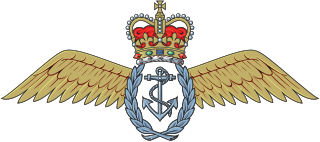
The Fleet Air Arm (FAA) is the naval aviation component of the United Kingdom's Royal Navy (RN). The FAA is one of five RN fighting arms. As of 2023 it is a primarily helicopter force, though also operating the F-35 Lightning II carrier-based stealth fighter jointly with the Royal Air Force.

The United States Merchant Marine is an organization composed of United States civilian mariners and U.S. civilian and federally owned merchant vessels. Both the civilian mariners and the merchant vessels are managed by a combination of the government and private sectors, and engage in commerce or transportation of goods and services in and out of the navigable waters of the United States. The Merchant Marine primarily transports domestic and international cargo and passengers during peacetime, and operate and maintain deep-sea merchant ships, tugboats, towboats, ferries, dredges, excursion vessels, charter boats and other waterborne craft on the oceans, the Great Lakes, rivers, canals, harbors, and other waterways. In times of war, the Merchant Marine can be an auxiliary to the United States Navy, and can be called upon to deliver military personnel and materiel for the military.
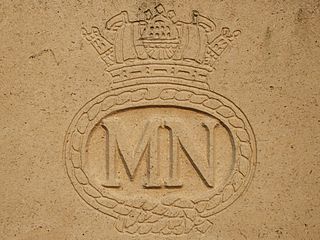
The British Merchant Navy is the collective name given to British civilian ships and their associated crews, including officers and ratings. In the UK, it is simply referred to as the Merchant Navy or MN. Merchant Navy vessels fly the Red Ensign and the ships and crew are regulated by the Maritime and Coastguard Agency (MCA), a specialist agency of the UK Department of Transport. British merchant ships are registered under the UK or Red Ensign group ship registries. British Merchant Navy deck officers and ratings are certificated and trained according to STCW Convention and the syllabus of the Merchant Navy Training Board in maritime colleges and other training institutes around the UK.

The Indian Navy is the maritime branch of the Indian Armed Forces. The President of India is the Supreme Commander of the Indian Navy. The Chief of Naval Staff, a four-star admiral, commands the navy. As a blue-water navy, it operates significantly in the Persian Gulf Region, the Horn of Africa, the Strait of Malacca, and routinely conducts anti-piracy operations and partners with other navies in the region. It also conducts routine two to three month-long deployments in the South and East China seas as well as in the western Mediterranean sea simultaneously.
Ensign is a junior rank of a commissioned officer in the armed forces of some countries, normally in the infantry or navy. As the junior officer in an infantry regiment was traditionally the carrier of the regimental colours, the rank acquired the name. This rank has generally been replaced in army ranks by second lieutenant. Ensigns were generally the lowest-ranking commissioned officer, except where the rank of subaltern existed. In contrast, the Arab rank of ensign, لواء, liwa', derives from the command of units with an ensign, not the carrier of such a unit's ensign, and is today the equivalent of a major general.
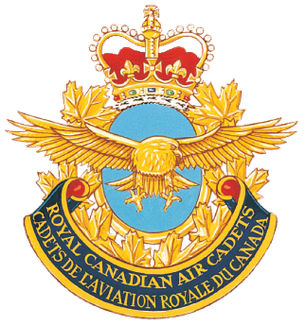
The Royal Canadian Air Cadets is a Canadian national youth program for young individuals aged 12 to 19. Under the authority of the National Defence Act, the program is administered by the Canadian Forces (CF) and funded through the Department of National Defence (DND). Additional support is provided by the civilian Air Cadet League of Canada (ACLC). Together with the Royal Canadian Sea Cadets and Royal Canadian Army Cadets, it forms the "largest federally funded youth program in the country". Cadets are not members of the military and are not obliged to join the Canadian Forces.
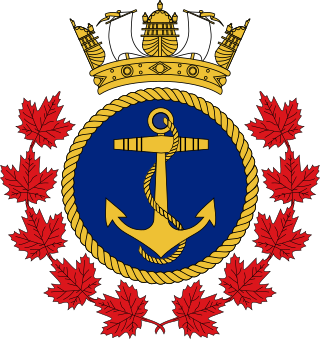
The Royal Canadian Sea Cadets is a Canadian national youth program sponsored by the Canadian Armed Forces and the civilian Navy League of Canada. Administered by the Canadian Forces, the program is funded through the Department of National Defence, with the civilian partner providing support in the local community. Cadets are not members of the Canadian Armed Forces.

The Commander-in-Chief Fleet (CINCFLEET) was the admiral responsible for the operations of the ships, submarines and aircraft of the British Royal Navy from 1971 until April 2012. The post was subordinate to the First Sea Lord, the professional head of the Naval Service. In its last years, as the Navy shrank, more administrative responsibilities were added.
International Convention on Standards of Training, Certification and Watchkeeping for Seafarers (STCW) sets minimum qualification standards for masters, officers and watch personnel on seagoing merchant ships and large yachts. STCW was adopted in 1978 by the International Maritime Organization (IMO) conference in London, and entered into force in 1984. The Convention was significantly amended in 1995 and 2010 entered into force on 1 January 2012.

The flag of the United States Navy consists of the seal of the U.S. Department of the Navy in the center, above a yellow scroll inscribed "United States Navy" in dark blue letters, against a dark blue background.

The Nigerian Navy (NN) is the naval branch of the Nigerian armed forces. With more than 70 warships, it is categorised as the fourth strongest navy in Africa. It is considered well-trained and has participated in several peacekeeping missions.
FOST may refer to:

The Fleet Operational Standards and Training (FOST) is a Royal Navy training organisation. FOST is the training organisation responsible for ensuring that Royal Navy and Royal Fleet Auxiliary vessels are fit to join the operational fleet.

The Fleet Commander is a senior Royal Navy post, responsible for the operation, resourcing and training of the ships, submarines and aircraft, and personnel, of the Naval Service. The Vice-Admiral incumbent is required to provide ships, submarines and aircraft ready for operations, and is based at Navy Command Headquarters.

In the United States Navy, United States Coast Guard, United States Public Health Service Commissioned Corps, and National Oceanic and Atmospheric Administration Commissioned Officer Corps, captain is the senior-most commissioned officer rank below that of flag officer. The equivalent rank is colonel in the United States Army, Air Force, Space Force, and Marine Corps.
Naval Home Command administered training and garrison functions for the Royal Navy from 1969 to 2012. Its commander was Commander-in-Chief, Naval Home Command (CINCNAVHOME).
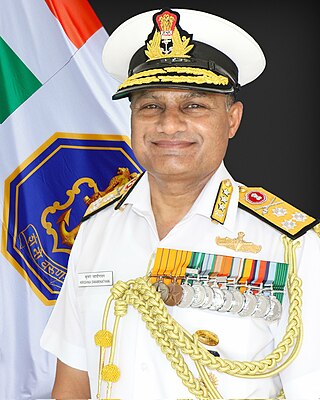
Vice Admiral Krishna Swaminathan, AVSM, VSM is a serving Flag officer in the Indian Navy. He currently serves as the Vice Chief of Naval Staff. He took over as the 39th Vice Chief of Naval staff on 1 May 2024. He previously served as Chief of Personnel. He earlier served as the Controller of Personnel Services, Chief of Staff of the Western Naval Command, Flag Officer Defence Advisory Group (FODAG), Flag Officer Commanding Western Fleet (FOCWF) and Flag Officer Sea Training (FOST). He was the second Commanding Officer of the aircraft carrier INS Vikramaditya.

The Flag Officer Sea Training (FOST) is a training organisation in the Indian Navy. FOST is the authority responsible for the operational sea training of all personnel of Indian Naval and Coast Guard ships and submarines. The organisation was instituted in 1992 and is the common authority to maintain battle efficiency standards. It also provides training to navies and maritime security forces of friendly foreign countries (FFC). Headquartered in Kochi, the FOST operates under the control of the Flag Officer Commanding-in-Chief Southern Naval Command.